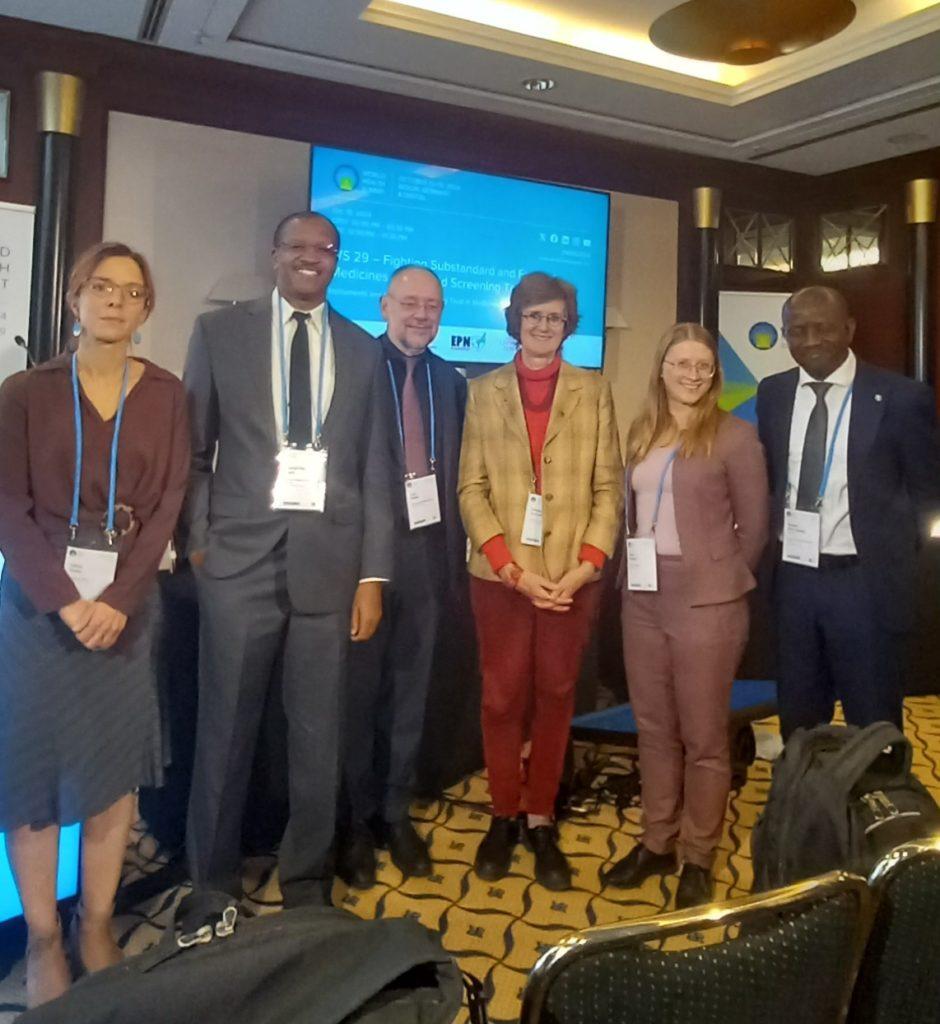
The World Health Summit (WHS) has been there for a while, but the edition of 2024 was my first one: I joined the more than 3,500 participants from 140 countries, squeezed in the JV Marriott in Berlin, and tried my best to navigate the different sessions. Sometimes I got stranded in front of an already-full room or an “invitation-only” event. But other times, I attended stimulating sessions, met old friends, and enjoyed great incidental conversations with like-minded people.
Nonetheless, my personal top-moment was the workshop on Fighting substandard and falsified (SF) medicines with rapid screening technologies, held on the last day and last timeslot of the Summit. It was organized and chaired by professor Lutz Heide of Tuebingen University. I had the privilege to be one of the speakers, together with Rutendo Kuwana, the WHO team lead for incidents with SF medicines, Richard Neci Cizungu of the Ecumenical Pharmaceutical Network (EPN), professor Eliangiringa Kaale of the Muhimbili University of Health and Allied Sciences (Tanzania) and Celine Caillet and Gesa Gnegel of the Infectious Diseases Data Observatory (IDDO).
The ostensible technicality of some interventions should not overshadow the relevance of this topic for global health. Indeed, substandard and falsified medical products, which before the pandemic were estimated to represent about 10% of all medicines available in low- and middle-income countries, cause direct but often undetected health harm (such as therapeutic failure and even direct toxicity). Moreover, they contribute to antimicrobial resistance (AMR), erode trust in medicines, and inflate the costs sustained by households and health systems.
Preventing the avoidable health harm caused by SF medicines looks like an obvious ethical imperative, even if like for other ethical imperatives it is not always supported by an unequivocal political will – to put it mildly.
If they are serious about protecting all lives, however, governments, donors and policy makers should first of all invest in prevention of SF medicines, by strengthening the national and regional regulatory capacities, and by protecting the integrity of supply chains. But what if SF medicines do reach the market? Well, these products should be identified as soon as possible, to allow a timely and adequate response in order to minimize the number of those harmed, and to design measures to prevent similar incidents in the future. This is detection, which is where rapid screening technologies come into play. These tools allow to identify the active and/or non-active ingredients of medicines in the field. They may be used for the initial screening of medicines’ quality in routine surveillance, or for the field investigation of specific incidents (such as the frequent and deadly syrups contamination with diethylene and ethylene glycol). In research, they are part of standardised quality surveys, through which researchers investigate the prevalence of SF medicines in a given region, and inform policy makers for further action.
In the workshop, speakers discussed the current “state of the art”, including the opportunities and limitations of existing and forthcoming technologies. They also shared their experiences with using them. The presentations were followed by a lively exchange with the audience, who in turn shared their own experiences with SF medicines, and joined the panel’s call for sustained and comprehensive support to the ongoing effort toward universal access toward quality-assured and safe medicines.
Yes, you read that correctly: universal access.
As pharmaceutical regulation and oversight, as well as sanctions against pharmaceutical crimes, are necessary but not sufficient, they should be embedded in a local and global ecosystem in which quality-assured essential medicines are made available in a timely way, and accessible and affordable to all those in need. As make no mistake, lack of access to ‘good’ medicines will inevitably create room for SF medicines.
We hope to have contributed to increased awareness at this year’s World Health Summit (and beyond) of the link between quality of medicines and access to them. By the way, the new Lancet 2050 Commission mentions the need of “directing a substantial and increasing fraction of budget transfers towards making available and affordable the specific drugs, vaccines, diagnostics, and other commodities required for control of the 15 priority conditions”. All these health technologies should be available, affordable and quality assured, for achieving health and equity in health for all.